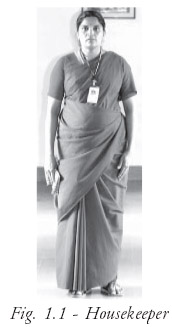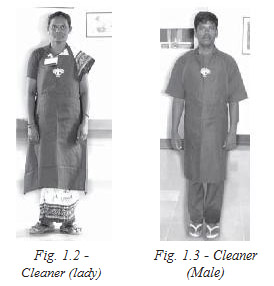Hospital Housekeeping
Housekeeping
Housekeeping is one of the basic functions essential
to the operation of a health care institution.
Housekeeping services, also called environmental
services, are of vital importance in providing a safe,
clean, pleasant, orderly, and functional environment
for both the patient and the hospital personnel. A
clean and hygienic environment has a tremendous
psychological impact on the patients and the visitors,
and speaks volumes of the quality of service the
hospital provides. Since it is difficult for lay people
to judge the quality of medical practice in a hospital,
opinion about a hospital is often formed on the basis
of its appearance and cleanliness. However,
bacteriological cleanliness should not be neglected.
Good housekeeping is an asset and a powerful
tool for public relations. It has a direct bearing on
the prestige and reputation of a hospital. As
housekeeping serves all departments and areas of the
hospital, minimizing the risk of cross infection and
providing a clean, safe and comfortable environment
are fundamental to any good housekeeping service.
The housekeeping department is essential to quality
service and needs to concentrate on both
bacteriological cleanliness and outward cleanliness.
The housekeeping department’s work has
advanced rapidly in recent years and requires not only
knowledge of technical skills but also an
understanding of the “Tools of Management”. A large
part of the house keeper’s time is taken up by
personnel management, as it is the housekeeper’s
responsibility to manage the cleaners, the largest and
most difficult class of human resource to manage.
The aim should be to have an efficiently run
department with operating cost as low as possible.
The housekeeping department should not be
considered in isolation, as it is an important source
of information for many other departments. Hence
a co-operative and pleasant staff helps to provide a
cordial and congenial atmosphere in the hospital.
The housekeeping department is a non-revenue
producing service department. However, a poorly run
department results in money needlessly spent, creates
a negative impression on the patients, visitors and
staff, and adversely affects their perception of the
quality of care provided by the hospital. This in turn
will adversely affect frequenting of patients to the
hospital that would indirectly affect the revenue.
Housekeeping department
The main objective of the housekeeping department
is to keep the hospital clean, safe and infection-free,
yet maintain a pleasant and friendly atmosphere. The
housekeeping department works closely with other
departments in making the hospital a pleasant and
safe place for the patients. It ensures a good ambience,
makes sure that the patients are comfortable and the
staff has a pleasant environment to work in. It also
controls physical facilities and individual activities to
minimize patient, employee or visitor injury and
exposure to infectious disease.
As the patients enter the hospital, they come
through the reception hall, and as the prescribed basic
examinations are carried out, the patients are taken to
several areas in the hospital. At each of these places the
patient notices various aspects of cleanliness and interior
design that creates a tasteful and pleasant atmosphere.
Housekeepers not only need to pay attention to
the basic cleanliness and hygiene, but also help in the
efficient functioning of the various sections such as linen,
pest control, waste management, garden maintenance,
electricity, water supply, carpentry and food distribution.
It is a difficult but important task to set up a
housekeeping department in a hospital. The staff in
other departments can help to lessen the housekeeping
department’s workload by maintaining cleanliness in
their respective areas and co-operating with the
housekeepers in their day to day work. This can be
achieved easily with the housekeeper’s ability to
communicate effectively.
Administrative set-up of the housekeeping department

Administrative set-up of the department may vary
according to the size of the hospital. The chart given
above is a model. The housekeeping department, as
already mentioned, has multiple functions to
perform. Housekeeping services may be requested at
any time of the day or night. Hence the staff structure
must be arranged so as to provide all necessary
services. Personalised services remain an important
part of quality health care and are also largely provided
by the housekeeping department.
The executive housekeeper, as head of the
department, must coordinate the performance of these
functions to develop the most efficient department
possible. However, the executive housekeeper cannot
single-handedly discharge all housekeeping functions
such as supervision, requisition, scheduling, and
budgeting. Therefore, delegation of authority through
a clear chain of command is necessary to ensure a
thorough completion of each function/job. It must

however be remembered that although authority is delegated, the executive housekeeper retains full responsibility for the department.

Dress code for housekeeping staff Ladies
- - Hair should be neatly combed into a bun, neatly tied back or cut short
- - No make-up
- - Uniform should be neat and clean
- - No jewellery, except watch and ring or chain that denote wedded status
- - Clean footwear (Fig. 1.1 & Fig. 1.2)
Gents
- - The hair should be worn short and neatly combed
- - Should be clean shaven
- - Uniform should be neat and clean
- - Clean footwear (Fig. 1.3)
Objectives of the housekeeping department
- - To ensure a comfortable and infection-free environment for the patients
- - To create a pleasant and friendly atmosphere
- - To ensure that everything under their supervision is kept neat and clean
- - To train and supervise effectively those who are working with them
- - Establish a good working relationship with all other departments.
- - Ensure that all staff is informed of hospital safety and security regulations.
Requisite skills of housekeepers
In order to work effectively, one must know how to work efficiently.
Management
Delegation :Work should be delegated to the staff as per their capabilities. The staff should be supervised regularly, and their work evaluated periodically.
Work management:If several tasks need to be completed on a particular day, the tasks need to be prioritised, so as to complete the tasks in order of their importance.
Time management: In order to complete a given work in the stipulated time, the materials required for the task should be kept ready and at hand.
People management: It is an art to work with others. A good and efficient housekeeper must develop good communication skills, and a pleasant attitude.
Budgeting
A well-run housekeeping department runs at minimum cost to the institution. Hence the good housekeeper has to be good at planning and selecting equipment and supplies that are high in quality and moderate in price.
An eye for beauty
Creating a beautiful and pleasant ambience is one of the housekeeping objectives. A housekeeper should therefore have good artistic sense to be able to decorate the area appropriately.
New recruits should undergo training before they are put on the job. The housekeeper can then delegate work to them, and check the work once it is completed. It is rude to watch the workers while they are working. This attitude indicates that you do not trust them, and will make them uncomfortable. If the workers commit an error, do not criticise them in front of others or yell at them. Call them aside and correct them. If however, they continue to work in the same unsatisfactory manner, immediate disciplinary action can be taken.
Building good relationship is essential to develop a good and loyal staff. This can be done by taking an interest in their well-being. Greet them every morning with a smile, and make polite enquiries about their families. Try and help them to sort out their problems with work or inter-personal problems with any other staff member. Being pleasant to people you are working with makes them feel a part of the “Organisation family”, and will result in their giving their best to the organisation.
Evaluation of workers
In order to ensure continuing efficiency, it is important that the staff is evaluated from time to time. This exercise will be effective, if the following points are kept in mind:
- - Pay individual attention to each worker and supervise the work
- - Observe if the worker completes the work in the stipulated time
- - Help the worker if there is a problem related to the work
- - If needed, plan additional training for the worker and give him on the job training
- - Observe attitude of worker toward other workers in the department
For demonstration on the dress code of housekeepers and cleaners, please watch the video of the CD.
Student exercise
Answer the following
- Why is it necessary to have a housekeeping department in a health care institution?
- What are the basic qualities you would look for when appointing a housekeeper?
- Why is periodic evaluation of workers necessary for efficient functioning of the department?



